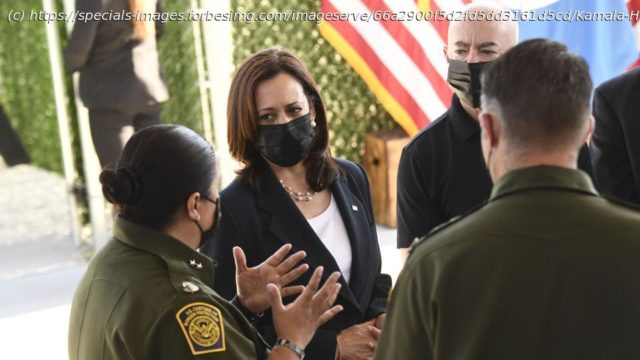The vice president was given a much more narrow task on immigration than her critics have claimed.
Topline
House Republicans passed a resolution Thursday criticizing Vice President Kamala Harris’ record on immigration as attacks on her work have ramped up since she became the presumptive Democratic presidential nominee—referring to her as the Biden administration’s “border czar”—but their criticisms misinterpret the actual task Harris was given on immigration, which is more narrowly focused on why people immigrate in the first place.Key Facts
The Trump campaign and his allies have made Harris’ handling of the border crisis into one of their main attacks against Harris in recent weeks at the Republican National Convention and as she’s taken over for President Joe Biden as nominee, and the House passed a resolution Thursday in a 220-196 vote that “strongly condemn[s] the Biden Administration and its Border Czar, Kamala Harris’s, failure to secure the United States border.”
Biden tapped Harris in March 2021 to lead a much more narrow diplomatic effort to curb migration from the “Northern Triangle” countries—Guatemala, Honduras and El Salvador—and address the root causes for why residents there immigrate to the U.S. in the first place, along with enhancing other countries’ borders that those migrants travel through along the way before they get to the U.S.
She was never tasked with managing border security in the U.S., which is under the purview of Homeland Security Secretary Alejandro Mayorkas, who said in June 2021 Harris is “leading our nation’s efforts to address the root causes—that fundamental question of why people leave their homes,” while he is “address[ing] the security and management of our border.”
Harris has led efforts on addressing those root causes, particularly in getting private sector investment in the region to improve its economy—which the White House said in March had created 250,000 jobs—with Honduran Minister of Investment Miguel Medina telling CNN that working with major companies is “not something that is accessible to a normal company in Honduras” without U.S. involvement, and “if it wasn’t for this being moved from the White House, there’s … no way we could have had the success” the initiative on private sector investment has had.
Addressing the root causes of migration is something that by nature will take longer to bear fruit than more immediate efforts to stop migrants at the border—so it’s harder to see how Harris’ work has had an impact—with Muzaffar Chishti, a senior fellow at the nonpartisan Migration Policy Institute, telling TIME that while the VP did “reasonably well” in working with the private sector, her assignment is one “that could not produce results anytime soon.






